人教版(2019)必修 第二册Unit 5 Music单词课件(共58张PPT)
文档属性
| 名称 | 人教版(2019)必修 第二册Unit 5 Music单词课件(共58张PPT) |
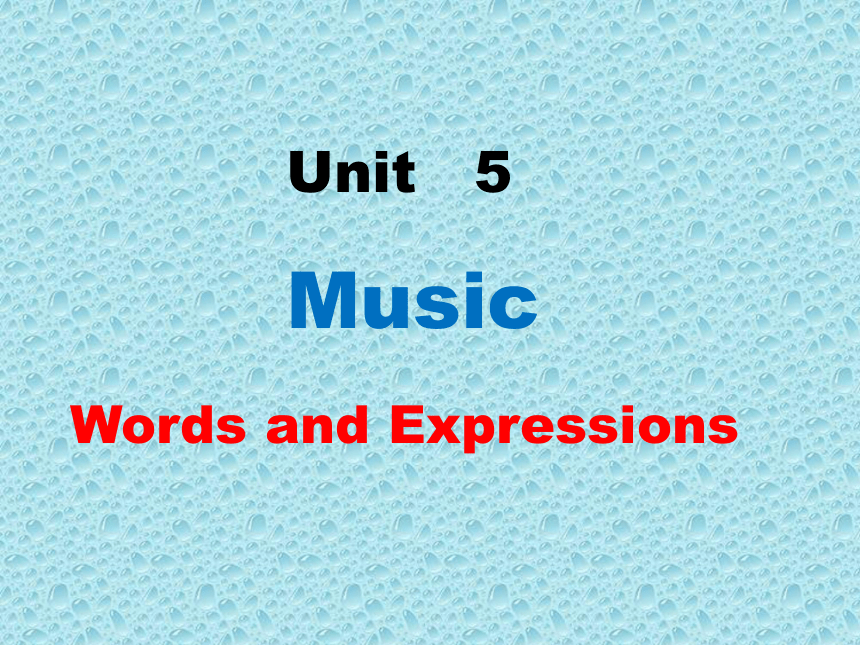
|
|
| 格式 | pptx | ||
| 文件大小 | 395.9KB | ||
| 资源类型 | 教案 | ||
| 版本资源 | 人教版(2019) | ||
| 科目 | 英语 | ||
| 更新时间 | 2024-08-23 00:00:00 | ||
图片预览

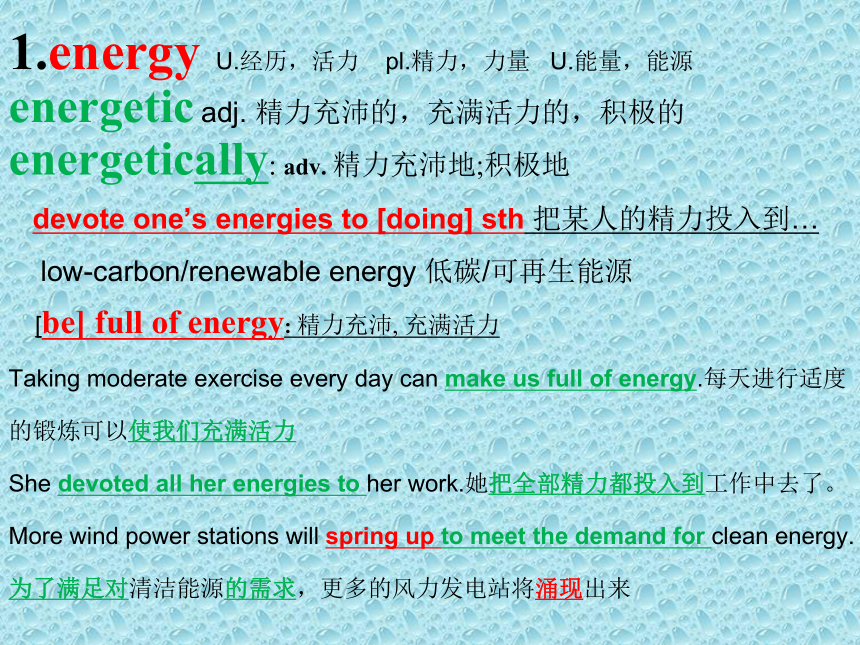
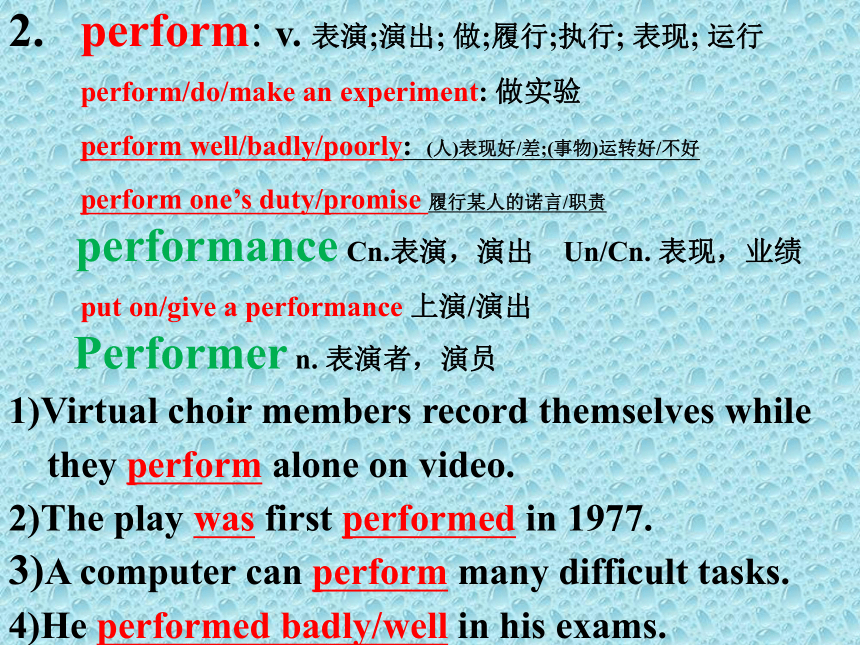

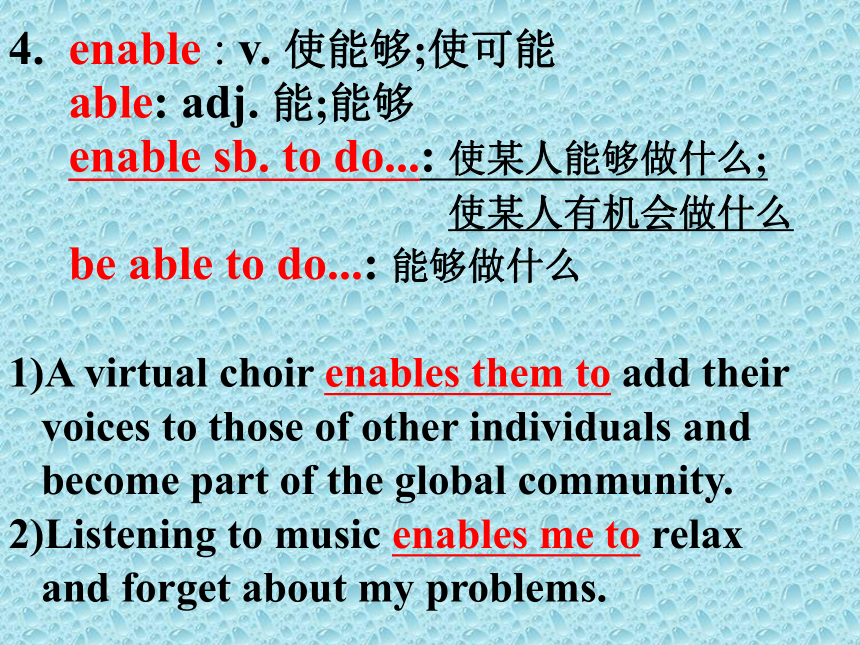
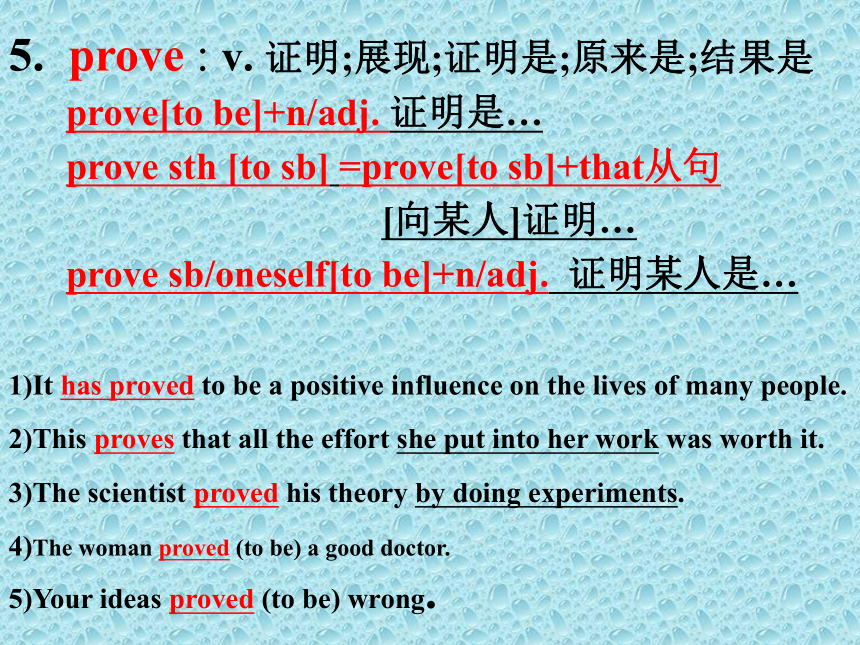
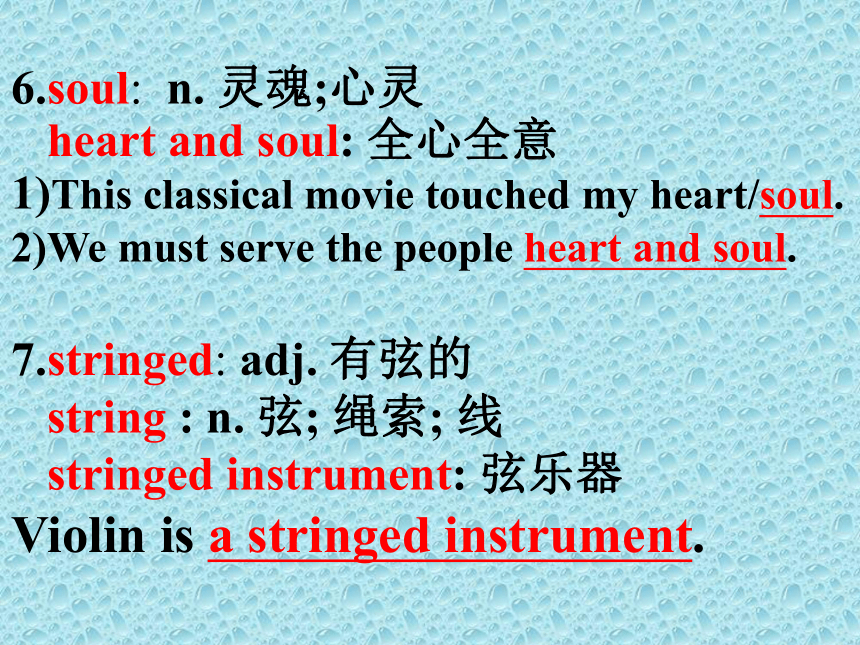
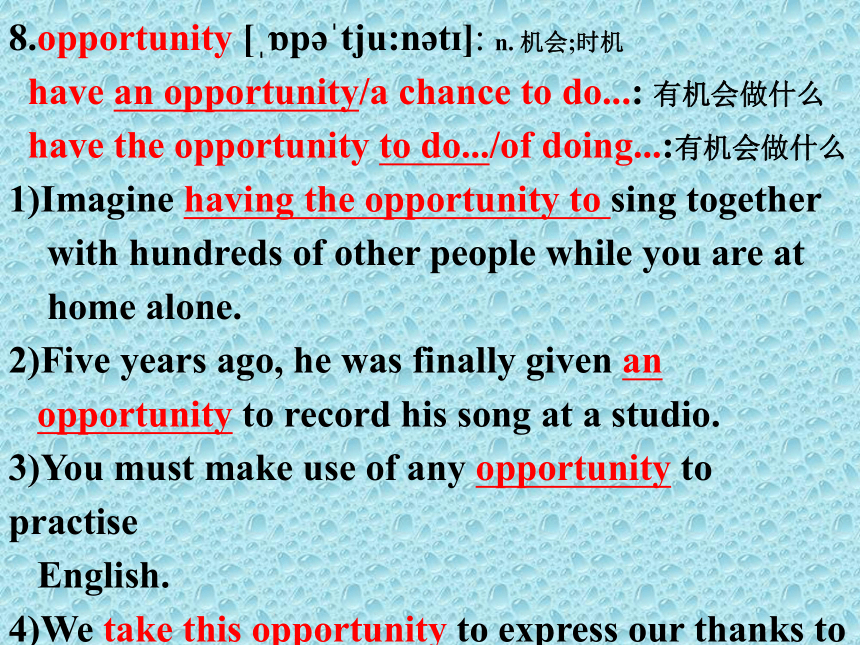
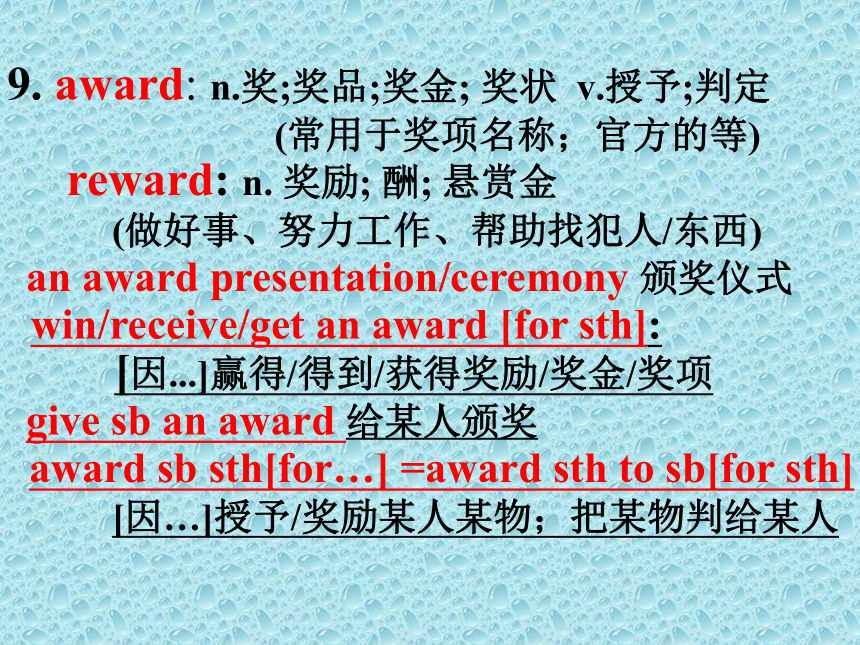
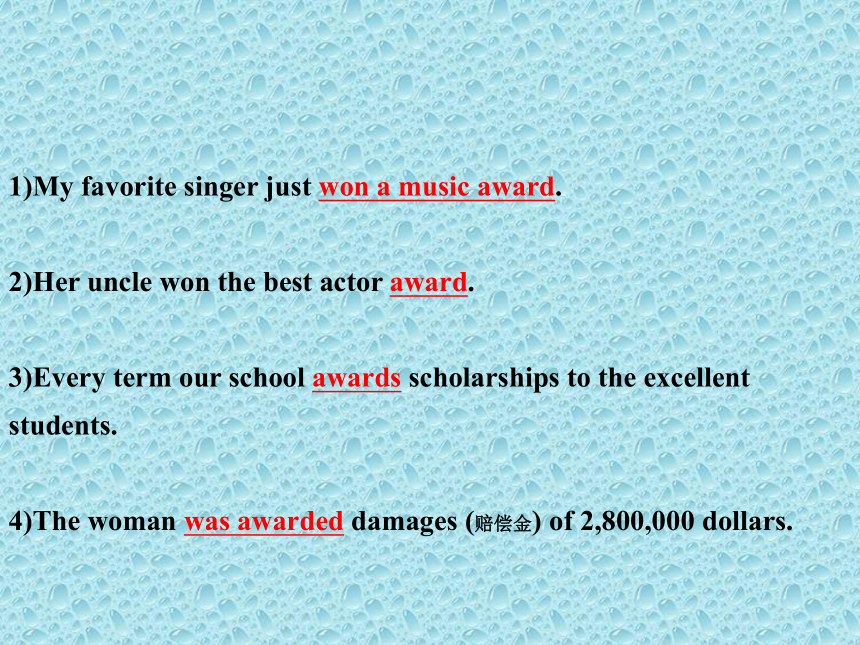
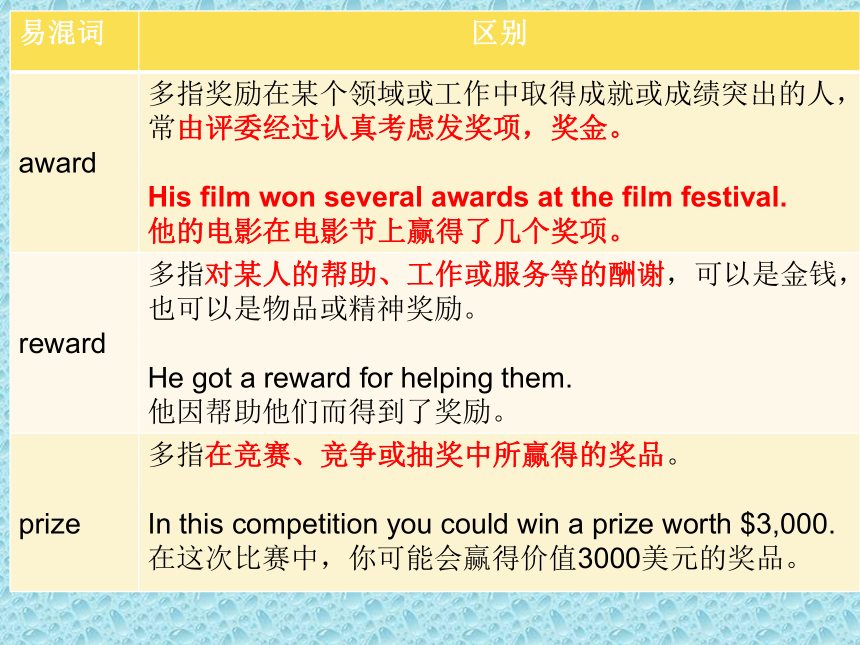
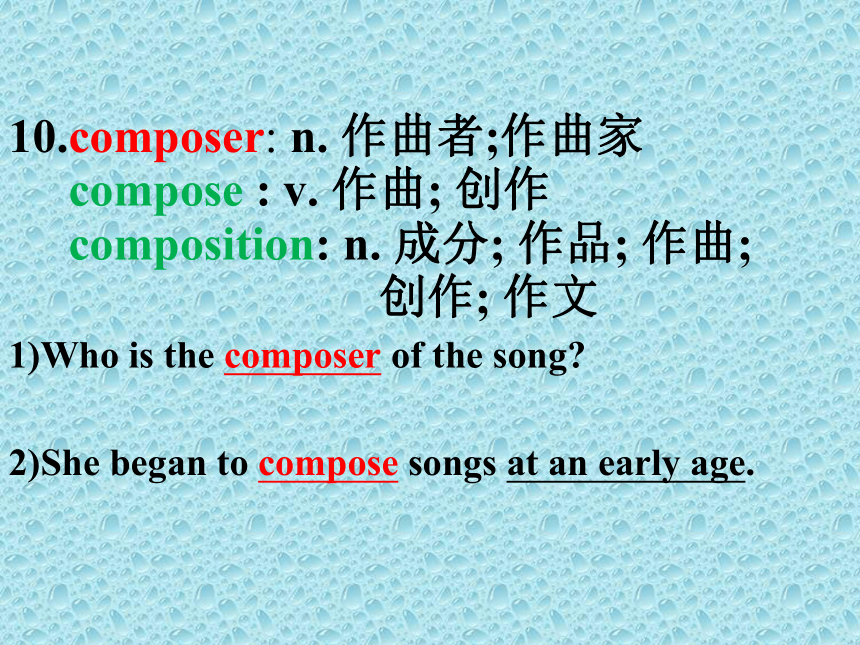
文档简介
(共58张PPT)
Unit 5
Music
Words and Expressions
1.energy U.经历,活力 pl.精力,力量 U.能量,能源
energetic adj. 精力充沛的,充满活力的,积极的
energetically: adv. 精力充沛地;积极地
devote one’s energies to [doing] sth 把某人的精力投入到…
low-carbon/renewable energy 低碳/可再生能源
[be] full of energy: 精力充沛, 充满活力
Taking moderate exercise every day can make us full of energy.每天进行适度的锻炼可以使我们充满活力
She devoted all her energies to her work.她把全部精力都投入到工作中去了。
More wind power stations will spring up to meet the demand for clean energy.为了满足对清洁能源的需求,更多的风力发电站将涌现出来
2. perform: v. 表演;演出; 做;履行;执行; 表现; 运行
perform/do/make an experiment: 做实验
perform well/badly/poorly: (人)表现好/差;(事物)运转好/不好
perform one’s duty/promise 履行某人的诺言/职责
performance Cn.表演,演出 Un/Cn. 表现,业绩
put on/give a performance 上演/演出
Performer n. 表演者,演员
1)Virtual choir members record themselves while
they perform alone on video.
2)The play was first performed in 1977.
3)A computer can perform many difficult tasks.
4)He performed badly/well in his exams.
3.ordinary: adj. 普通的;平凡的
ordinarily adv.普通地,平场地,一般情况下
ordinary/average/common people:平民; 老百姓
1)A virtual choir helps connect ordinary people together.
2)Ever since, his success has shown the world that even
ordinary people can become famous.
3)That was just an ordinary weekend for us.
ordinary:普通的,平常的;强调“平常”,无奇特之处。
common:常见的,普通的;强调许多事物具有的某种共同点。
normal:标准的,正常的;形容人或物符合常态或常规。
usual:通常的,惯常的;形容一个人通常所做的事情或常发生的事
4. enable : v. 使能够;使可能
able: adj. 能;能够
enable sb. to do...: 使某人能够做什么;
使某人有机会做什么
be able to do...: 能够做什么
1)A virtual choir enables them to add their
voices to those of other individuals and
become part of the global community.
2)Listening to music enables me to relax
and forget about my problems.
5. prove : v. 证明;展现;证明是;原来是;结果是
prove[to be]+n/adj. 证明是…
prove sth [to sb] =prove[to sb]+that从句
[向某人]证明…
prove sb/oneself[to be]+n/adj. 证明某人是…
1)It has proved to be a positive influence on the lives of many people.
2)This proves that all the effort she put into her work was worth it.
3)The scientist proved his theory by doing experiments.
4)The woman proved (to be) a good doctor.
5)Your ideas proved (to be) wrong.
6.soul: n. 灵魂;心灵
heart and soul: 全心全意
1)This classical movie touched my heart/soul.
2)We must serve the people heart and soul.
7.stringed: adj. 有弦的
string : n. 弦; 绳索; 线
stringed instrument: 弦乐器
Violin is a stringed instrument.
8.opportunity [ p tju:n t ]: n. 机会;时机
have an opportunity/a chance to do...: 有机会做什么
have the opportunity to do.../of doing...:有机会做什么
1)Imagine having the opportunity to sing together
with hundreds of other people while you are at
home alone.
2)Five years ago, he was finally given an
opportunity to record his song at a studio.
3)You must make use of any opportunity to practise
English.
4)We take this opportunity to express our thanks to
you.
9. award: n.奖;奖品;奖金; 奖状 v.授予;判定
(常用于奖项名称;官方的等)
reward: n. 奖励; 酬; 悬赏金
(做好事、努力工作、帮助找犯人/东西)
an award presentation/ceremony 颁奖仪式
win/receive/get an award [for sth]:
[因...]赢得/得到/获得奖励/奖金/奖项
give sb an award 给某人颁奖
award sb sth[for…] =award sth to sb[for sth]
[因…]授予/奖励某人某物;把某物判给某人
1)My favorite singer just won a music award.
2)Her uncle won the best actor award.
3)Every term our school awards scholarships to the excellent students.
4)The woman was awarded damages (赔偿金) of 2,800,000 dollars.
易混词 区别
award 多指奖励在某个领域或工作中取得成就或成绩突出的人,常由评委经过认真考虑发奖项,奖金。
His film won several awards at the film festival.
他的电影在电影节上赢得了几个奖项。
reward 多指对某人的帮助、工作或服务等的酬谢,可以是金钱,也可以是物品或精神奖励。
He got a reward for helping them.
他因帮助他们而得到了奖励。
prize 多指在竞赛、竞争或抽奖中所赢得的奖品。
In this competition you could win a prize worth $3,000.
在这次比赛中,你可能会赢得价值3000美元的奖品。
poser: n. 作曲者;作曲家
compose : v. 作曲; 创作
composition: n. 成分; 作品; 作曲;
创作; 作文
1)Who is the composer of the song
2)She began to compose songs at an early age.
11. fall in love with...: 爱上(强调动作)
be in love with...: 爱上(强调状态)
1)He fell in love with Mozart’s classical music when
he sang for the university choir.
2)She fell in love with her boss last year.
3)They have been in love with each other for ten
years.
12.original: Cn. 原件;原作 adj. 原来的;独创的;原作的,首创的
original works 原创作品
originally: adv. 原来;起初
origin: n. 起源;源头; 身世
originate vi. 起源,发源[常与from连用]
1.In my opinion, reading the original work is better than
seeing the film based on it.
在我看来,阅读原著比观看基于其改编的电影更好
2.Only original documents will be accepted as proof of
status.只有文件原件才能用作身份证明
3.This painting is a copy; the original is in China.
这幅画是复制品,原画在中国
4.This building has been returned to the original owner.
5.The original painting is now worth 200,000,000 dollars.
13.phenomenon: n. (复数phenomena)现象
cultural/natural/social phenomena:
文化/自然/社会现象
1)Since then, the virtual choir has
become a worldwide phenomenon.
2)The picture describes a very common
phenomenon in our society.
14.stage : n.(发展或进展的)时期;阶段;舞台
1)His wife used to be an actress, but she said
goodbye to the stage when they married.
2)China’s high-speed railway industry has entered
a rapid growing stage of development.
stage作先行词,在定语从句中作地点状语,引导词用where:
We have reached a stage where we have almost no rights at all.
15.altogether: adv. [用以强调]全部,总共
together: adv. 在一起; 共同
1)The plane went slower and slower until
it stopped altogether.
2)I am not altogether happy about the plan.
3)You have lent me 1000 euros altogether.
4)The food was good and we loved the
music. Altogether it was a great evening.
16. thus: adv. 如此;因此;所以;于是
so: conj. 因此;所以
therefore: adv. 因此;所以
1)The virtual choir is a wonderful way for people
around the world to sing with one voice and thus
make the world a better place.
2)Most of the evidence is destroyed. Thus, it’s
impossible to prove that the drug is harmful.
3)She wants to enter a key university.
Thus/Therefore, she studies harder and harder.
4)He doesn’t live here. Thus(,) I think he has
parted(分开) with his wife.
5)He doesn’t live here, so I think he has parted
with the woman.
17.rap : n. 快速敲击;说唱音乐
v. 敲击;(说唱歌中的)念白
knock on/at...: 敲(门/窗等)
rap on...: 敲...
1)I fell in love with rap music when I was a
teenager.
2)There was a sharp rap on the door.
3)She rapped angrily on the door.
4)The kids of the band not only rapped
but also sang.
18.nowadays [ na de z]: adv. 现在;目前
≈ now ≈ at present ≈ at the present time
1)Nowadays millions of musical
performances are uploaded into
the Internet every day.
2)Nowadays most kids prefer playing
games to reading books.
19.gradual: adj. 逐渐的;渐进的
gradually: adv. 逐渐地;逐步地
1)There has been a gradual increase in
the number of people who own cars.
2)They expect a gradual improvement
in sales of new cars.
3)Gradually, the students began to
understand the importance of study.
20.capable:adj. 有能力的;有才能的
capability:[Un/Cn].能力;才能
incapable:adj. 没有能力的
able:adj. 能够; 有才能的
unable:adj. 没有能力的
ability:n. 能力;才能
be capable of sth./doing...:有能力/才能(做)什么
be able to do...: 能够做什么
1)She’s a capable/an able teacher/doctor.
2)My father is a strong, capable man.
3)The man is capable of doing everything.
21.relief: n. (焦虑/痛苦的)减轻或消除;
(不快过后的)宽慰/轻松/解脱 relieve vt.减轻,解除
relieve stress/anxiety
缓解压力/消除焦虑
a sense of relief: 解脱感
in/with relief : 如释重负;松了口气
to one’s relief : 令人感到欣慰的是...
it is a relief to… …是让人欣慰/轻松的事
1)News of their safety came as a great relief.
2)I felt a great relief when l heard I had
passed the driving test.
3)To my relief, the car was not damaged.
to one’s sorrow= to the sorrow of sb:
to one’s+ /joy/pleasure/delight/
surprise/amazement/
excitement/
regret/anger/disappointment/
shame/relief…
使某人悲痛/高兴/惊奇/兴奋/遗憾/气愤/失望
/羞愧/欣慰的是…
(使某人很…的是:在to 前加much/quite或者 名词前加 great)
特别注意: to one’s 后的词是不可数名词。不可以加s、ed、ing。
22.cure: v. 治愈;治好(疾病);
解决(问题)
n. 药物;治疗; (解决问题;改善糟糕情况的)措施
cure + 人/疾病: 治愈/治好人/疾病
cure sb of sth 治疗某人的某种疾病
改正某人的某种不良行为
treat sb for + 疾病:治疗某人的疾病
treat sb with + 药:用药治疗某人
treat + 疾病:治疗疾病
(treat: 强调治疗过程---treat sb for sth
cure: 强调治疗结果---cure sb of sth)
1)Though he was affected by gradual
blindness soon after the performance,
Henry was still capable of writing
compositions and he found that creating
music was a relief and cure for his illness.
2)Will you be able to cure the old man
3)She was cured with a new medicine.
4)There is still no cure for this kind of cancer.
5)Punishment can never be a good cure
for social problems.
23. absorbed adj: 专心致志,全神贯注
absorb: v. 吸收;吸引;使专心
be/get absorbed in sb/[doing]sth:
被...吸引住; 专心致志于…
concentrate on/upon...: 专心于...
put one’s heart into... : 专心于...
focus on/upon...: 特别关注; 聚焦于
1)All the students are absorbed in the expert’s lecture on China’s
economy.
2)He found the girls absorbed in watching the TV play.
“全神贯注于”的其他短语:
concentrate/focus[one’s attention] on/upon
be lost in
be buried in
24.previous: adj. 先前的;以往的
previously : adv. 先前;以前
1)When he got absorbed in his world of
music, he felt as if he could “see” the
beauty of the world around him, like
he had in his previous life.
2)No previous experience is necessary for this
job.
3)This year’s harvest is better than any
previous year’s.
25.unemployed [ n m pl d]: adj. 失业的;待业的
employ[ m pl ]: v. 雇用;利用(时间/精力等)
employee[ m pl i:]: n. 雇工;雇员
employer[ m pl (r)]: n. 雇主;老板
employment: n. 雇用;职业;就业
hire/employ sb.: 雇佣某人
fire/dismiss sb.: 解雇某人
1)Dave was unemployed so he had time to
consider what job he really wanted.
2)How long have you been unemployed
26.romantic : adj. 浪漫的 n. 浪漫的人
romance n. 浪漫史;传奇色彩
1)The girl was moved by his romantic words so she
accepted his gift.
2)Why don’t you ever give me flowers I wish
you’d be more romantic.
3)Hugo is one of the greatest romantic poets.
4)You’re a hopeless romantic.
27.impact: n. 巨大影响;强大作用;冲击力
v. 有影响/作用 ;冲击
impact on/upon 对…有影响/作用
have an impact on/upon sth/sb: 对…有影响
make an impact (on...): (对…)产生影响
have an/no effect on/upon…:
对…有/无效果(作用/影响)
have an/no influence on/upon…:
对…有/无效果(作用/影响)
make a difference to sb/sth
对…产生影响
1)Well known as a successful band, the
Impact members show quite a few
striking qualities.
2)It’s an honour to be here and to share
with you the story of how music has
had an impact on my life.
3)Dolly’s appearance had a great impact
on the media and public imagination.
28.aim : n. 目标;目的;瞄准
v. 力求达到; 力争做到; 瞄准 ;目的是;旨在
aimless adj. 无目标的,无计划的,无方向的
aimlessly adv.漫无目的地
achieve the aim/goal: 实现目标
aim[sth]at[sb/sth]…:[把…]瞄准…; 针对
aim at/for sth:力求达到/努力争取某事
be aimed at[doing]sth:目的是…; 旨在;针对
aim to do...: =aim at doing sth力争做...; 目的是...
take aim at…:把目标对准…; 把批评的矛头指向…
with the aim of...: 以...为目标; 目的是
achieve/fulfill one’s aim 实现某人的目标
1)David’s one aim in life is to earn a lot of money.
2)Teamwork is required in order to achieve these
aims.
3)She went to London with the aim of finding a job.
4)Filled with team spirit, they act as a whole,
always aiming for glory.
5)The school aims to guide and help students to live
a happy life.
29. set sth up: 安装好(设备或机器); 设立;
建立; 准备;安排
1)I will set up the machine today so that you can
work tomorrow.
2)A new government was set up after the war.
3)The leaders encouraged the people to set up their
own business.
30.equipment: Un. 设备;装备 (不可数名词)
equip: v. (equipped -- equipping)
装备;配备;使具备
equip sb/sth with sth 用某物装备某人/某物
be equipped with 装备有,配备有
1)The engineer has set up all the equipment.
2)Last month we bought new equipment for the labs.
常用的不可数名词有:advice, news, weather, climate, information, baggage/luggage, wealth, paper, work, homework, housework, paperwork, equipment, room/space(空间), grammar, evidence, fun, practice, wood, progress, furniture, cash, money, change(零钱。作为“变化”讲时,有单复数。), garbage/rubbish, cloth, clothing, ink, blood, bread, water, air, sweat, milk, tea, juice, beer, wine, rain, snow, ice, fog, soil, oil, silk, wool, sand, sugar, heat, coal, cheese , meat, rice, corn ,wheat, corn, butter, soup, oxygen , gold, grass…, 食物,粮食,金属等。不可数名词没有单数、复数,前面不可加a/an, 不可以给它们加s或者es。它们前面可以加: the, this, that , some, any, one’s, much, a little, little, a lot of = lots of =plenty of, a good/great deal of
31.try out (for...): 参加…选拔/试演;
测试; 试验;试用
sign up for...: 报名参加...
1)Who can try out as a performer
2)Last month she tried out for the school football
team.
3)I’m always pleased to try out a new teaching
method.
32.talent: n. 天才;天资; 天赋= gift
have [a] talent/gift for...: 在…有…天赋
show [a] talent for 展现出…方面的天赋
talented/gifted :有才能的;有才干的
a person of many talents 多才多艺的人
1)What can those who think they do not have musical talent do
2)It’s always interesting to watch other people show their talents.
3)He is proud that both his children have a talent/gift for art.
talented adj.有才干的,有才能的
be talented in[doing] … 在做…方面有天赋
gift Cn.天赋,才能
have a gift for 在…方面有天赋
gifted adj. 有天才的,有天赋的
be gifted in 在…方面有天赋
33.piano [p ' n ]: n. 钢琴(复数pianos)
pianist [ p n st]: n. 钢琴弹奏者;钢琴家
1)John, you can play the piano.
2)When I was young, I dreamed of becoming a
pianist.
3)Can you play the guitar/the violin
【play与乐器名词连用时, 乐器前要加 the】
34.assume: v. 以为;假设;假装
assumption Cn.假定,假设
make an assumption做出假设
assuming: conj. 假如= if
assuming+that从句
Assuming it rains tomorrow morning, what shall we do
assume [that]… 假设…,认为…
assume sb/sth to be +n./adj. 以为某人/某物是…
it is[generally] assumed that… 人们[普遍]认为…
35.addition [ d n]: n. 添加;加法;增加物
add [ d]: v.增加; 加添; 补充说; 继续说
add to sth: 增加
add … to…: 给…加上…
add up: 把…加起来
add up to...: 总计
add sb to the group chat: 拉某人入群/进群
add sb on Wechat: 加微信
in addition to sb/sth/doing...:
除…以外(还)
in addition: 此外, 另外 ≈ besides
1)The baby is a happy addition to his family.
2)In addition to my pay, I got a lot of tips.
3)In addition, computer is also very helpful
for study and work.
4)You need skills to do the work well; in
addition, you need patience(耐心).
36.disease [d zi z]: n. (疾)病(常指具体的病)
illness: n. (身体或精神上的) 疾病;病
sickness: n. 疾病;恶心; 呕吐
mental illness: 精神病
heart disease/touble/attack: 心脏病
1)Two years ago, I was told I had a serious
disease which was difficult to cure.
2)He suffers from a rare blood disease.
37.ache: v. / n. 疼痛
headache /stomachache/toothache:
头痛/胃痛/牙痛
1)My body ached all the time and thus I thought I
didn’t have much longer to live.
2)Every bone in my body seems to ache.
3)It makes my heart ache to see such waste.
4)She felt/had a dull ache(隐隐的痛) in her shoulder.
38.treatment: n. 治疗;疗法; 对待;处理
treat: v. 治疗;对待;款待
treat…as…: 把…作为…对待
1)Then one day, I had to go through a
two-hour medical treatment.
2)This new cancer treatment offers hope to
many sufferers.
3)She treats her dog as a child.
39. from (then) on: 从(那时)起
from now on: 从现在起
from last year/1978 on: 从去年/1978年起
【on可以改为onward/forward】
1)The song made me feel so much better
that from then on I began to listen to music
all the time.
2)Jack failed his exams last term and
from then on his parents stopped
him from playing computer games.
3)From now on we will study hard.
40.lean : v. 依靠;倾斜 (leant [lent] /leaned)
lean on/upon...: 依靠;依赖
= depend/rely on/upon...
1)Can I lean my bike against the wall
2)She walked slowly, leaning on her son’s arm.
3)He leans heavily on his family.
41. get through: (设法)处理;完成;
度过(难关);熬过(困难/不快的时期);
通过(考试);
用电话联系上,打通 get through [to sb]
穿越,通过
用完,耗尽
1)It was the rock I leant on to become strong and to get through those hard times.
2)I don’t know how we’re going to get through all this work by tomorrow.
3)It is hard to see how the poor people will get through the winter.
4)Have you got through an entrance examination
5)I’ve been trying to ring up all day and I couldn’t get through.
42.moreover: adv. 而且;此外
≈ what is more ≈ besides
≈ in addition ≈ furthermore
1)I don’t like the house, and moreover, the price is
too high.
2)Moreover, I realize it is very important to have a rest
at noon.
3)It is a good book, and what is more, it’s quite a
cheap one.
43.satisfaction: n. 满足;满意;欣慰
satisfy : v. 使满意;使满足;满足
satisfied : adj. 满意的;满足的
be satisfied/content with… 对…感到满意
be satisfied to do sth 对做某事感到满意
satisfying : adj. 令人满意/满足的
to one’s satisfaction:
=to the satisfaction of sb使某人满意的是
with great satisfaction: 满意地
a satisfied expression/look/smile:
满意的表情/微笑
1)Moreover, music gave me hope and a sense of
satisfaction.
2)Looking at a beautiful painting always gives me a feeling
of satisfaction.
3)He expressed satisfaction with the results.
4)To our satisfaction, the children made great/big progress
in their studies.
44.being: n. 身心;存在;生物
come into being: 形成; 产生
a human being: 人
1)It became my best friend. It spoke
words of encouragement to deepest
part of my being.
2) I hated him with my whole being.
3) A new president has come into being.
4) When did the universe come into being
45.various [ ve ri s]: adj.
各种不同的;各种各样的
variety [ ve ri s]: n. 种类;多样化
vary [ ve ri]: v. 变化;改变
differ -- different -- difference
....................................................................
各种多样:
various+ 复数名词 + 复数动词
varieties of + 复数名词 + 复数动词
a variety of + 不可数名词 + 单数动词
46.somehow: adv. 以某种方式/方法;不知怎么地
1)I hope all of you will somehow begin to treasure
music and make it a part of your life.
2)Don’t worry, we’ll get the money back somehow.
3)Somehow we lost our way in the rainforest.
47.repetition: n. 重复;重做
repeat: v. 重复;重做
1)Her books are full of repetition and useless information.
2)Understanding is not enough. You must also have a lot of repetition.
3)She repeated his name softly over and over again.
48.reaction: n. 反应;回应
react : v. 反应;回应
react [to sth] [by doing sth]
[对…]做出反应;回应
a chemical reaction : 化学反应
1)What was his reaction to the news
2)My uncle is a skilled driver with quick reactions.
Unit 5
Music
Words and Expressions
1.energy U.经历,活力 pl.精力,力量 U.能量,能源
energetic adj. 精力充沛的,充满活力的,积极的
energetically: adv. 精力充沛地;积极地
devote one’s energies to [doing] sth 把某人的精力投入到…
low-carbon/renewable energy 低碳/可再生能源
[be] full of energy: 精力充沛, 充满活力
Taking moderate exercise every day can make us full of energy.每天进行适度的锻炼可以使我们充满活力
She devoted all her energies to her work.她把全部精力都投入到工作中去了。
More wind power stations will spring up to meet the demand for clean energy.为了满足对清洁能源的需求,更多的风力发电站将涌现出来
2. perform: v. 表演;演出; 做;履行;执行; 表现; 运行
perform/do/make an experiment: 做实验
perform well/badly/poorly: (人)表现好/差;(事物)运转好/不好
perform one’s duty/promise 履行某人的诺言/职责
performance Cn.表演,演出 Un/Cn. 表现,业绩
put on/give a performance 上演/演出
Performer n. 表演者,演员
1)Virtual choir members record themselves while
they perform alone on video.
2)The play was first performed in 1977.
3)A computer can perform many difficult tasks.
4)He performed badly/well in his exams.
3.ordinary: adj. 普通的;平凡的
ordinarily adv.普通地,平场地,一般情况下
ordinary/average/common people:平民; 老百姓
1)A virtual choir helps connect ordinary people together.
2)Ever since, his success has shown the world that even
ordinary people can become famous.
3)That was just an ordinary weekend for us.
ordinary:普通的,平常的;强调“平常”,无奇特之处。
common:常见的,普通的;强调许多事物具有的某种共同点。
normal:标准的,正常的;形容人或物符合常态或常规。
usual:通常的,惯常的;形容一个人通常所做的事情或常发生的事
4. enable : v. 使能够;使可能
able: adj. 能;能够
enable sb. to do...: 使某人能够做什么;
使某人有机会做什么
be able to do...: 能够做什么
1)A virtual choir enables them to add their
voices to those of other individuals and
become part of the global community.
2)Listening to music enables me to relax
and forget about my problems.
5. prove : v. 证明;展现;证明是;原来是;结果是
prove[to be]+n/adj. 证明是…
prove sth [to sb] =prove[to sb]+that从句
[向某人]证明…
prove sb/oneself[to be]+n/adj. 证明某人是…
1)It has proved to be a positive influence on the lives of many people.
2)This proves that all the effort she put into her work was worth it.
3)The scientist proved his theory by doing experiments.
4)The woman proved (to be) a good doctor.
5)Your ideas proved (to be) wrong.
6.soul: n. 灵魂;心灵
heart and soul: 全心全意
1)This classical movie touched my heart/soul.
2)We must serve the people heart and soul.
7.stringed: adj. 有弦的
string : n. 弦; 绳索; 线
stringed instrument: 弦乐器
Violin is a stringed instrument.
8.opportunity [ p tju:n t ]: n. 机会;时机
have an opportunity/a chance to do...: 有机会做什么
have the opportunity to do.../of doing...:有机会做什么
1)Imagine having the opportunity to sing together
with hundreds of other people while you are at
home alone.
2)Five years ago, he was finally given an
opportunity to record his song at a studio.
3)You must make use of any opportunity to practise
English.
4)We take this opportunity to express our thanks to
you.
9. award: n.奖;奖品;奖金; 奖状 v.授予;判定
(常用于奖项名称;官方的等)
reward: n. 奖励; 酬; 悬赏金
(做好事、努力工作、帮助找犯人/东西)
an award presentation/ceremony 颁奖仪式
win/receive/get an award [for sth]:
[因...]赢得/得到/获得奖励/奖金/奖项
give sb an award 给某人颁奖
award sb sth[for…] =award sth to sb[for sth]
[因…]授予/奖励某人某物;把某物判给某人
1)My favorite singer just won a music award.
2)Her uncle won the best actor award.
3)Every term our school awards scholarships to the excellent students.
4)The woman was awarded damages (赔偿金) of 2,800,000 dollars.
易混词 区别
award 多指奖励在某个领域或工作中取得成就或成绩突出的人,常由评委经过认真考虑发奖项,奖金。
His film won several awards at the film festival.
他的电影在电影节上赢得了几个奖项。
reward 多指对某人的帮助、工作或服务等的酬谢,可以是金钱,也可以是物品或精神奖励。
He got a reward for helping them.
他因帮助他们而得到了奖励。
prize 多指在竞赛、竞争或抽奖中所赢得的奖品。
In this competition you could win a prize worth $3,000.
在这次比赛中,你可能会赢得价值3000美元的奖品。
poser: n. 作曲者;作曲家
compose : v. 作曲; 创作
composition: n. 成分; 作品; 作曲;
创作; 作文
1)Who is the composer of the song
2)She began to compose songs at an early age.
11. fall in love with...: 爱上(强调动作)
be in love with...: 爱上(强调状态)
1)He fell in love with Mozart’s classical music when
he sang for the university choir.
2)She fell in love with her boss last year.
3)They have been in love with each other for ten
years.
12.original: Cn. 原件;原作 adj. 原来的;独创的;原作的,首创的
original works 原创作品
originally: adv. 原来;起初
origin: n. 起源;源头; 身世
originate vi. 起源,发源[常与from连用]
1.In my opinion, reading the original work is better than
seeing the film based on it.
在我看来,阅读原著比观看基于其改编的电影更好
2.Only original documents will be accepted as proof of
status.只有文件原件才能用作身份证明
3.This painting is a copy; the original is in China.
这幅画是复制品,原画在中国
4.This building has been returned to the original owner.
5.The original painting is now worth 200,000,000 dollars.
13.phenomenon: n. (复数phenomena)现象
cultural/natural/social phenomena:
文化/自然/社会现象
1)Since then, the virtual choir has
become a worldwide phenomenon.
2)The picture describes a very common
phenomenon in our society.
14.stage : n.(发展或进展的)时期;阶段;舞台
1)His wife used to be an actress, but she said
goodbye to the stage when they married.
2)China’s high-speed railway industry has entered
a rapid growing stage of development.
stage作先行词,在定语从句中作地点状语,引导词用where:
We have reached a stage where we have almost no rights at all.
15.altogether: adv. [用以强调]全部,总共
together: adv. 在一起; 共同
1)The plane went slower and slower until
it stopped altogether.
2)I am not altogether happy about the plan.
3)You have lent me 1000 euros altogether.
4)The food was good and we loved the
music. Altogether it was a great evening.
16. thus: adv. 如此;因此;所以;于是
so: conj. 因此;所以
therefore: adv. 因此;所以
1)The virtual choir is a wonderful way for people
around the world to sing with one voice and thus
make the world a better place.
2)Most of the evidence is destroyed. Thus, it’s
impossible to prove that the drug is harmful.
3)She wants to enter a key university.
Thus/Therefore, she studies harder and harder.
4)He doesn’t live here. Thus(,) I think he has
parted(分开) with his wife.
5)He doesn’t live here, so I think he has parted
with the woman.
17.rap : n. 快速敲击;说唱音乐
v. 敲击;(说唱歌中的)念白
knock on/at...: 敲(门/窗等)
rap on...: 敲...
1)I fell in love with rap music when I was a
teenager.
2)There was a sharp rap on the door.
3)She rapped angrily on the door.
4)The kids of the band not only rapped
but also sang.
18.nowadays [ na de z]: adv. 现在;目前
≈ now ≈ at present ≈ at the present time
1)Nowadays millions of musical
performances are uploaded into
the Internet every day.
2)Nowadays most kids prefer playing
games to reading books.
19.gradual: adj. 逐渐的;渐进的
gradually: adv. 逐渐地;逐步地
1)There has been a gradual increase in
the number of people who own cars.
2)They expect a gradual improvement
in sales of new cars.
3)Gradually, the students began to
understand the importance of study.
20.capable:adj. 有能力的;有才能的
capability:[Un/Cn].能力;才能
incapable:adj. 没有能力的
able:adj. 能够; 有才能的
unable:adj. 没有能力的
ability:n. 能力;才能
be capable of sth./doing...:有能力/才能(做)什么
be able to do...: 能够做什么
1)She’s a capable/an able teacher/doctor.
2)My father is a strong, capable man.
3)The man is capable of doing everything.
21.relief: n. (焦虑/痛苦的)减轻或消除;
(不快过后的)宽慰/轻松/解脱 relieve vt.减轻,解除
relieve stress/anxiety
缓解压力/消除焦虑
a sense of relief: 解脱感
in/with relief : 如释重负;松了口气
to one’s relief : 令人感到欣慰的是...
it is a relief to… …是让人欣慰/轻松的事
1)News of their safety came as a great relief.
2)I felt a great relief when l heard I had
passed the driving test.
3)To my relief, the car was not damaged.
to one’s sorrow= to the sorrow of sb:
to one’s+ /joy/pleasure/delight/
surprise/amazement/
excitement/
regret/anger/disappointment/
shame/relief…
使某人悲痛/高兴/惊奇/兴奋/遗憾/气愤/失望
/羞愧/欣慰的是…
(使某人很…的是:在to 前加much/quite或者 名词前加 great)
特别注意: to one’s 后的词是不可数名词。不可以加s、ed、ing。
22.cure: v. 治愈;治好(疾病);
解决(问题)
n. 药物;治疗; (解决问题;改善糟糕情况的)措施
cure + 人/疾病: 治愈/治好人/疾病
cure sb of sth 治疗某人的某种疾病
改正某人的某种不良行为
treat sb for + 疾病:治疗某人的疾病
treat sb with + 药:用药治疗某人
treat + 疾病:治疗疾病
(treat: 强调治疗过程---treat sb for sth
cure: 强调治疗结果---cure sb of sth)
1)Though he was affected by gradual
blindness soon after the performance,
Henry was still capable of writing
compositions and he found that creating
music was a relief and cure for his illness.
2)Will you be able to cure the old man
3)She was cured with a new medicine.
4)There is still no cure for this kind of cancer.
5)Punishment can never be a good cure
for social problems.
23. absorbed adj: 专心致志,全神贯注
absorb: v. 吸收;吸引;使专心
be/get absorbed in sb/[doing]sth:
被...吸引住; 专心致志于…
concentrate on/upon...: 专心于...
put one’s heart into... : 专心于...
focus on/upon...: 特别关注; 聚焦于
1)All the students are absorbed in the expert’s lecture on China’s
economy.
2)He found the girls absorbed in watching the TV play.
“全神贯注于”的其他短语:
concentrate/focus[one’s attention] on/upon
be lost in
be buried in
24.previous: adj. 先前的;以往的
previously : adv. 先前;以前
1)When he got absorbed in his world of
music, he felt as if he could “see” the
beauty of the world around him, like
he had in his previous life.
2)No previous experience is necessary for this
job.
3)This year’s harvest is better than any
previous year’s.
25.unemployed [ n m pl d]: adj. 失业的;待业的
employ[ m pl ]: v. 雇用;利用(时间/精力等)
employee[ m pl i:]: n. 雇工;雇员
employer[ m pl (r)]: n. 雇主;老板
employment: n. 雇用;职业;就业
hire/employ sb.: 雇佣某人
fire/dismiss sb.: 解雇某人
1)Dave was unemployed so he had time to
consider what job he really wanted.
2)How long have you been unemployed
26.romantic : adj. 浪漫的 n. 浪漫的人
romance n. 浪漫史;传奇色彩
1)The girl was moved by his romantic words so she
accepted his gift.
2)Why don’t you ever give me flowers I wish
you’d be more romantic.
3)Hugo is one of the greatest romantic poets.
4)You’re a hopeless romantic.
27.impact: n. 巨大影响;强大作用;冲击力
v. 有影响/作用 ;冲击
impact on/upon 对…有影响/作用
have an impact on/upon sth/sb: 对…有影响
make an impact (on...): (对…)产生影响
have an/no effect on/upon…:
对…有/无效果(作用/影响)
have an/no influence on/upon…:
对…有/无效果(作用/影响)
make a difference to sb/sth
对…产生影响
1)Well known as a successful band, the
Impact members show quite a few
striking qualities.
2)It’s an honour to be here and to share
with you the story of how music has
had an impact on my life.
3)Dolly’s appearance had a great impact
on the media and public imagination.
28.aim : n. 目标;目的;瞄准
v. 力求达到; 力争做到; 瞄准 ;目的是;旨在
aimless adj. 无目标的,无计划的,无方向的
aimlessly adv.漫无目的地
achieve the aim/goal: 实现目标
aim[sth]at[sb/sth]…:[把…]瞄准…; 针对
aim at/for sth:力求达到/努力争取某事
be aimed at[doing]sth:目的是…; 旨在;针对
aim to do...: =aim at doing sth力争做...; 目的是...
take aim at…:把目标对准…; 把批评的矛头指向…
with the aim of...: 以...为目标; 目的是
achieve/fulfill one’s aim 实现某人的目标
1)David’s one aim in life is to earn a lot of money.
2)Teamwork is required in order to achieve these
aims.
3)She went to London with the aim of finding a job.
4)Filled with team spirit, they act as a whole,
always aiming for glory.
5)The school aims to guide and help students to live
a happy life.
29. set sth up: 安装好(设备或机器); 设立;
建立; 准备;安排
1)I will set up the machine today so that you can
work tomorrow.
2)A new government was set up after the war.
3)The leaders encouraged the people to set up their
own business.
30.equipment: Un. 设备;装备 (不可数名词)
equip: v. (equipped -- equipping)
装备;配备;使具备
equip sb/sth with sth 用某物装备某人/某物
be equipped with 装备有,配备有
1)The engineer has set up all the equipment.
2)Last month we bought new equipment for the labs.
常用的不可数名词有:advice, news, weather, climate, information, baggage/luggage, wealth, paper, work, homework, housework, paperwork, equipment, room/space(空间), grammar, evidence, fun, practice, wood, progress, furniture, cash, money, change(零钱。作为“变化”讲时,有单复数。), garbage/rubbish, cloth, clothing, ink, blood, bread, water, air, sweat, milk, tea, juice, beer, wine, rain, snow, ice, fog, soil, oil, silk, wool, sand, sugar, heat, coal, cheese , meat, rice, corn ,wheat, corn, butter, soup, oxygen , gold, grass…, 食物,粮食,金属等。不可数名词没有单数、复数,前面不可加a/an, 不可以给它们加s或者es。它们前面可以加: the, this, that , some, any, one’s, much, a little, little, a lot of = lots of =plenty of, a good/great deal of
31.try out (for...): 参加…选拔/试演;
测试; 试验;试用
sign up for...: 报名参加...
1)Who can try out as a performer
2)Last month she tried out for the school football
team.
3)I’m always pleased to try out a new teaching
method.
32.talent: n. 天才;天资; 天赋= gift
have [a] talent/gift for...: 在…有…天赋
show [a] talent for 展现出…方面的天赋
talented/gifted :有才能的;有才干的
a person of many talents 多才多艺的人
1)What can those who think they do not have musical talent do
2)It’s always interesting to watch other people show their talents.
3)He is proud that both his children have a talent/gift for art.
talented adj.有才干的,有才能的
be talented in[doing] … 在做…方面有天赋
gift Cn.天赋,才能
have a gift for 在…方面有天赋
gifted adj. 有天才的,有天赋的
be gifted in 在…方面有天赋
33.piano [p ' n ]: n. 钢琴(复数pianos)
pianist [ p n st]: n. 钢琴弹奏者;钢琴家
1)John, you can play the piano.
2)When I was young, I dreamed of becoming a
pianist.
3)Can you play the guitar/the violin
【play与乐器名词连用时, 乐器前要加 the】
34.assume: v. 以为;假设;假装
assumption Cn.假定,假设
make an assumption做出假设
assuming: conj. 假如= if
assuming+that从句
Assuming it rains tomorrow morning, what shall we do
assume [that]… 假设…,认为…
assume sb/sth to be +n./adj. 以为某人/某物是…
it is[generally] assumed that… 人们[普遍]认为…
35.addition [ d n]: n. 添加;加法;增加物
add [ d]: v.增加; 加添; 补充说; 继续说
add to sth: 增加
add … to…: 给…加上…
add up: 把…加起来
add up to...: 总计
add sb to the group chat: 拉某人入群/进群
add sb on Wechat: 加微信
in addition to sb/sth/doing...:
除…以外(还)
in addition: 此外, 另外 ≈ besides
1)The baby is a happy addition to his family.
2)In addition to my pay, I got a lot of tips.
3)In addition, computer is also very helpful
for study and work.
4)You need skills to do the work well; in
addition, you need patience(耐心).
36.disease [d zi z]: n. (疾)病(常指具体的病)
illness: n. (身体或精神上的) 疾病;病
sickness: n. 疾病;恶心; 呕吐
mental illness: 精神病
heart disease/touble/attack: 心脏病
1)Two years ago, I was told I had a serious
disease which was difficult to cure.
2)He suffers from a rare blood disease.
37.ache: v. / n. 疼痛
headache /stomachache/toothache:
头痛/胃痛/牙痛
1)My body ached all the time and thus I thought I
didn’t have much longer to live.
2)Every bone in my body seems to ache.
3)It makes my heart ache to see such waste.
4)She felt/had a dull ache(隐隐的痛) in her shoulder.
38.treatment: n. 治疗;疗法; 对待;处理
treat: v. 治疗;对待;款待
treat…as…: 把…作为…对待
1)Then one day, I had to go through a
two-hour medical treatment.
2)This new cancer treatment offers hope to
many sufferers.
3)She treats her dog as a child.
39. from (then) on: 从(那时)起
from now on: 从现在起
from last year/1978 on: 从去年/1978年起
【on可以改为onward/forward】
1)The song made me feel so much better
that from then on I began to listen to music
all the time.
2)Jack failed his exams last term and
from then on his parents stopped
him from playing computer games.
3)From now on we will study hard.
40.lean : v. 依靠;倾斜 (leant [lent] /leaned)
lean on/upon...: 依靠;依赖
= depend/rely on/upon...
1)Can I lean my bike against the wall
2)She walked slowly, leaning on her son’s arm.
3)He leans heavily on his family.
41. get through: (设法)处理;完成;
度过(难关);熬过(困难/不快的时期);
通过(考试);
用电话联系上,打通 get through [to sb]
穿越,通过
用完,耗尽
1)It was the rock I leant on to become strong and to get through those hard times.
2)I don’t know how we’re going to get through all this work by tomorrow.
3)It is hard to see how the poor people will get through the winter.
4)Have you got through an entrance examination
5)I’ve been trying to ring up all day and I couldn’t get through.
42.moreover: adv. 而且;此外
≈ what is more ≈ besides
≈ in addition ≈ furthermore
1)I don’t like the house, and moreover, the price is
too high.
2)Moreover, I realize it is very important to have a rest
at noon.
3)It is a good book, and what is more, it’s quite a
cheap one.
43.satisfaction: n. 满足;满意;欣慰
satisfy : v. 使满意;使满足;满足
satisfied : adj. 满意的;满足的
be satisfied/content with… 对…感到满意
be satisfied to do sth 对做某事感到满意
satisfying : adj. 令人满意/满足的
to one’s satisfaction:
=to the satisfaction of sb使某人满意的是
with great satisfaction: 满意地
a satisfied expression/look/smile:
满意的表情/微笑
1)Moreover, music gave me hope and a sense of
satisfaction.
2)Looking at a beautiful painting always gives me a feeling
of satisfaction.
3)He expressed satisfaction with the results.
4)To our satisfaction, the children made great/big progress
in their studies.
44.being: n. 身心;存在;生物
come into being: 形成; 产生
a human being: 人
1)It became my best friend. It spoke
words of encouragement to deepest
part of my being.
2) I hated him with my whole being.
3) A new president has come into being.
4) When did the universe come into being
45.various [ ve ri s]: adj.
各种不同的;各种各样的
variety [ ve ri s]: n. 种类;多样化
vary [ ve ri]: v. 变化;改变
differ -- different -- difference
....................................................................
各种多样:
various+ 复数名词 + 复数动词
varieties of + 复数名词 + 复数动词
a variety of + 不可数名词 + 单数动词
46.somehow: adv. 以某种方式/方法;不知怎么地
1)I hope all of you will somehow begin to treasure
music and make it a part of your life.
2)Don’t worry, we’ll get the money back somehow.
3)Somehow we lost our way in the rainforest.
47.repetition: n. 重复;重做
repeat: v. 重复;重做
1)Her books are full of repetition and useless information.
2)Understanding is not enough. You must also have a lot of repetition.
3)She repeated his name softly over and over again.
48.reaction: n. 反应;回应
react : v. 反应;回应
react [to sth] [by doing sth]
[对…]做出反应;回应
a chemical reaction : 化学反应
1)What was his reaction to the news
2)My uncle is a skilled driver with quick reactions.
